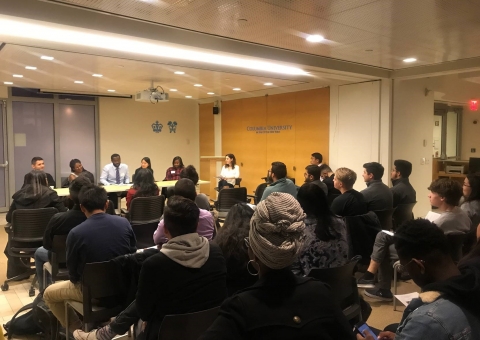As a Columbia First-Generation and/or Low Income (FLI) student, you have the type of valuable skills that employers seek in their candidates. These skills, such as strong work ethic, resourcefulness, and adaptability, are in high demand.
Many FLI students share common questions about their unique job and internship searches. We will address some of those questions on this page, including:
- Who can I connect with at Columbia for support in the job and internship search?
- How do I showcase the skills and experience I have gained from on-campus work or part-time jobs? How can I make this equal to internship experience?
- How can I explore a range of industries and jobs?
- How can I balance my internship and job search with competing priorities?
- How does being a FLI student come up in the career search? How can I connect with and learn from others about their experiences?
- How do I evaluate an offer and negotiate salary?
- How and where can I find resources when an experience is unpaid?
Career Counseling
You can connect with a career counselor who will partner with you through every step of your search. Together you can set goals and build plans to meet those goals. You can have as many one-to-one career counseling appointments as you need. No preparation necessary!
We understand you may have competing priorities that make an in-person visit hard. For your convenience, you can schedule a virtual appointment through Make an Appointment system. We also offer in-person and virtual Quick Questions as a way to quickly see a career counselor without needing to pre-book.
Developing Your Narrative: Articulating Your Strengths and Qualities
There are unique skills and qualities that you have developed by being the first in your family to attend college and/or low income. These may include:
- Resourcefulness
- Strength in intercultural communications and ability to communicate across difference
- Relationship-building skills
- Time-management skills
- Resilience
At CCE, we can work with you to reflect on your life and draw out skills and abilities that you have developed over time. We can help you think about how to speak with employers and alumni about these experiences. You have many strengths that have brought you to Columbia and that will develop through your time here. We can help you to build confidence articulating these strengths to others.
Experience isn’t limited to internships at well-known companies. There are many ways to develop skills. These can include working in a lab for class or a part-time job off campus. Other ways to develop your skill set might be hosting a general body meeting for your student club or volunteering at a local community organization.
As you think about translating this experience to a job or internship, you can ask yourself the following:
- What skills or qualifications are employers asking for?
- When are times I’ve used those skills in a similar or different setting or context?
- Which stories demonstrate those skills?
- Are there opportunities for me to focus on or ask for projects at my current job that will help me build or deepen a necessary skill for my field of interest?
- Can I propose a project that will fill an organizational need while allowing me to build a new skill set?
For a variety of reasons, you may be feeling pressure to pursue a particular career direction. We can help you think about and explore so that you are able to connect your skills and interests with potential paths. The best way to get started is to have a conversation with a career counselor to learn about ways to explore and connections to employers and alumni.
In preparing for interviews with employers, networking conversations, or events, you can use:
- Career Counseling and Practice Interview Appointments: Meet with a career counselor to talk about interview preparation or practice answering interview questions, with guidance and feedback.
- Big Interview: Use this free practice interviewing platform to record a video of yourself answering interview questions. After you record your answers, you can then share them with a CCE career counselor, your mentor, friends, and/or family for feedback.
- Clothing Closet: Borrow a suit from CCE for any career purpose. This includes networking events, interviews, and career fairs.
Finding and Building Your Network
Your networking can start by thinking about those you have interacted with at Columbia—other students, advisors, faculty, alumni, etc.— and on your way to Columbia. CCE can help you connect with alumni and other professionals to learn about different fields, meet mentors, and build your network.
- LinkedIn: Connect with the Columbia Career Connections and Columbia Alumni Association groups. If you have participated in past college success programs or are currently part of a network such as Questbridge, connect with current and past participants.
- The Columbia Mentoring Initiative: Led by Multicultural Affairs, CMI is an inter-generational mentorship program that connects first-year students with returning students and all students with alumni. It is open to all undergraduates in Columbia College and Columbia Engineering.
- Odyssey Mentor Platform: Utilize this platform to identify and connect with FLI alumni. You can filter by First-Generation and/or Low Income.
- CCE’s Job Shadowing, Internship, and Mentorship Programs: Explore career industries and opportunities and learn from professionals working in your target industries. These programs also offer additional benefits such as stipends/financial aid, alumni mentorship, career counseling support, professional development trainings, and a community of peers.
- Diversity Recruitment Programs: Explore Diversity Recruitment Programs that provide additional support and access to internships and full-time jobs.
- CCE Events: Join CCE-specific events for FLI students such as Backstage Pass.
Not sure where to start? We have a brief overview video. You can always use a career counseling appointment to create your own networking plan.
Salary Expectations and Evaluating Offers
There are several factors that go into the decision of whether or not to accept a job or internship, but CCE is prepared to partner with you each step of the way. Additionally, as a FLI student, there may be additional considerations or obligations that we can help you plan for.
Some of the ways CCE can help you during career counseling:
- Discuss your plans and expected budget
- Learn how to research and prepare for or roleplay a salary negotiation
From your room, you can also take a look at our resources on salary negotiation and evaluating offers. These include resources on how to make a budget or find out what a typical salary is for a specific location, field, or position and consideration for aspects of a salary that can, for example, include transitional funding such as support for relocation or perks like a cell phone or a vehicle.
For unpaid and low-paid opportunities in industries like the arts or not-for-profits, Columbia offers a number of funding programs that you can apply for.
Columbia Resources
- Multicultural Affairs FLI @ Columbia: provides an overview of the FLI community at Columbia, programs like the Columbia Mentoring Initiative, and a Resource Guide and Tip Sheets for common questions like Columbia & NYC on a Budget and Finding Affordable Textbooks.
- Student Financial Services, Federal Work Study: form of financial assistance provided to students through part-time employment
- First Generation Low Income Network (FLI Net) & QuestBridge Scholars Network: student organizations connecting the FLI community, offering programs and events.
- Columbia First-Generation Low Income Alumni Network (CFLAN): Columbia Alumni Association shared interest group
- CPS — First Gen counselors: as part of Columbia Psychological Services, counselors supporting first gen students in individual sessions or small groups
- Columbia University iGrad.com: Financial Education and wellness tools
- Columbia’s University Pre-Health Enrichment and Internships Programs and Partnerships: medical internship programs and partnerships for FLI students
- Summer Public Health Scholars Program: program designed for undergraduates entering their junior or senior year and recent baccalaureate degree students who are undecided about their career goals; includes Public Health coursework, hands-on field experience and immersion in a diverse, economically disadvantaged urban environment
- The Northeast Regional Alliance (NERA) MedPrep HCOP Academy Program: program to expand health careers preparation for minority and disadvantaged students from junior high school through medical school with the goal of increasing competitiveness for medical school.
- Summer Health Professions Education Program: program aimed to strengthen the academic proficiency and career development of students underrepresented in the health professions
- CC and SEAS Dean’s Assistance Fund: financial assistance for undergraduate Columbia Grant recipients with a Columbia Parent Contribution of approximately $5,000 or less
Additional Resources



